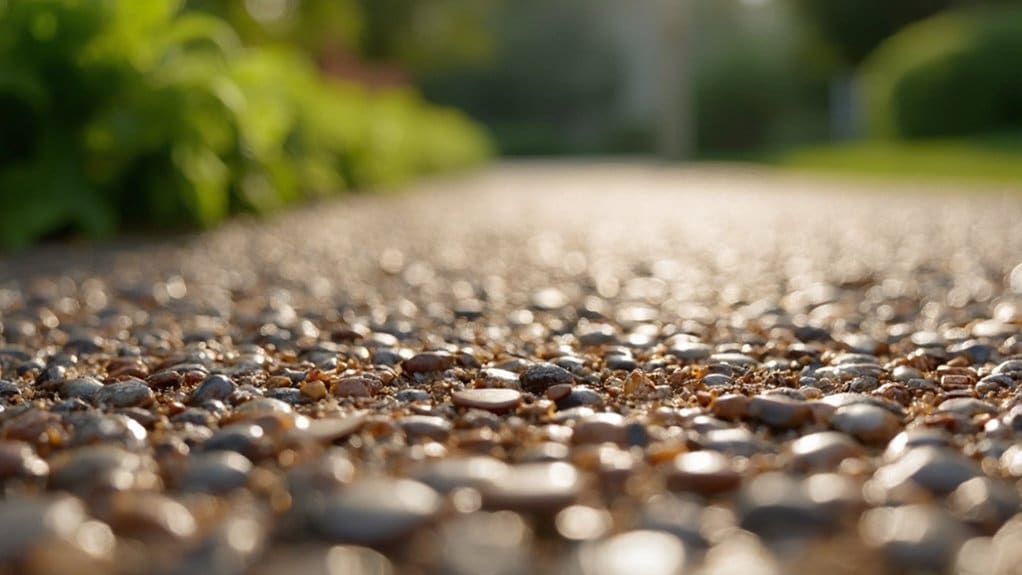Resin-bound gravel stands out as a practical choice, forming robust chemical bonds that create a hard-wearing surface lasting upwards of 20 years. The permeable surface handles British weather brilliantly, allowing rainwater to drain naturally – much like a garden lawn – which helps prevent puddles and meets SUDS (Sustainable Urban Drainage Systems) requirements. Unlike traditional gravel that needs frequent raking, this surface needs little upkeep beyond an occasional sweep and pressure wash. Its range of colours and finishes, from Cotswold stone to slate grey, can transform a tired driveway or garden path whilst boosting your property's kerb appeal. Whether for a small garden path or expansive driveway, the long-term benefits make it worth considering.
Key Takeaways
Resin-bound gravel creates sturdy bonds between stones and resin, much like super-glue sticking to glass, delivering a robust surface that stands up to daily use and British weather.
The porous surface handles our notorious UK rainfall brilliantly, letting water seep through naturally – rather like a giant sponge – which helps prevent puddles and waterlogging common with traditional paving.
Upkeep is refreshingly simple: just sweep occasionally and give it a blast with the pressure washer once or twice yearly. It's far less demanding than block paving, which often needs weeding and regular sand top-ups.
Estate agents reckon resin-bound driveways boost house values by 5-10%. With colour choices from subtle Cotswold stone to bold slate grey, it's a smart way to enhance your property's kerb appeal.
Using local aggregates and recycled materials where possible makes it an environmentally sound choice. The permeable surface helps maintain natural water tables, unlike concrete which can contribute to local flooding issues.
Installation and Manufacturing Process
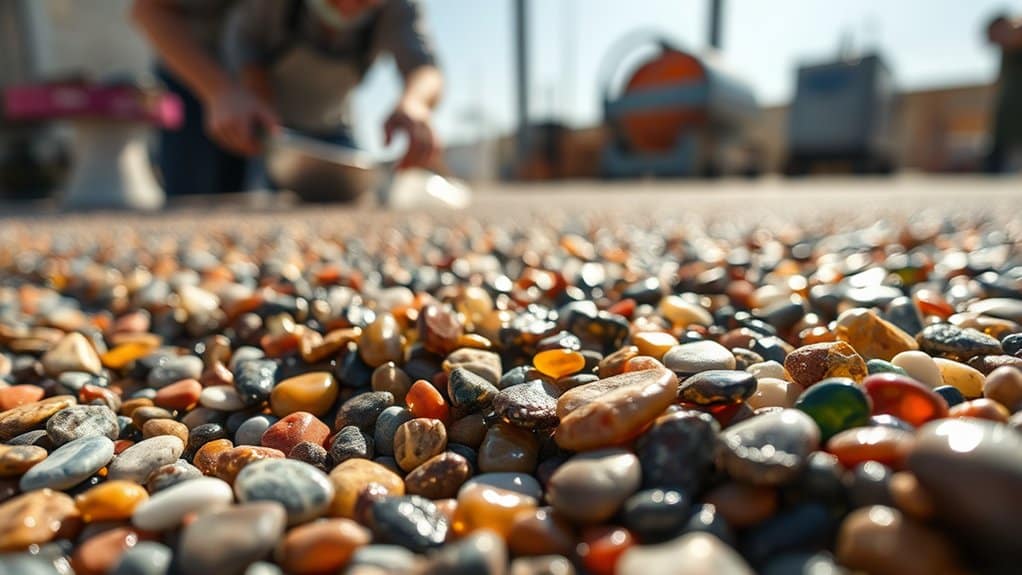
Installing resin-bound gravel requires careful prep work and precise methods to ensure a lasting, attractive finish.
First, clean your base (concrete, tarmac or compacted stone) with a pressure washer. Repair any cracks and fit a stabilising mesh if needed for extra strength. The base must be stable, clean, and permeable to provide a solid foundation for the resin, which is critical for achieving durability and longevity.
For mixing, combine your chosen resin (polyurethane or epoxy) with stone in a forced action mixer – stick to the manufacturer's mixing ratios to the letter. Adding UV stabilisers helps protect against British weather.
Spread the mixture evenly with a trowel, compact it well, and leave it to cure properly. A rushed job won't last, so take your time with each step.
Chemical Bonding and Durability
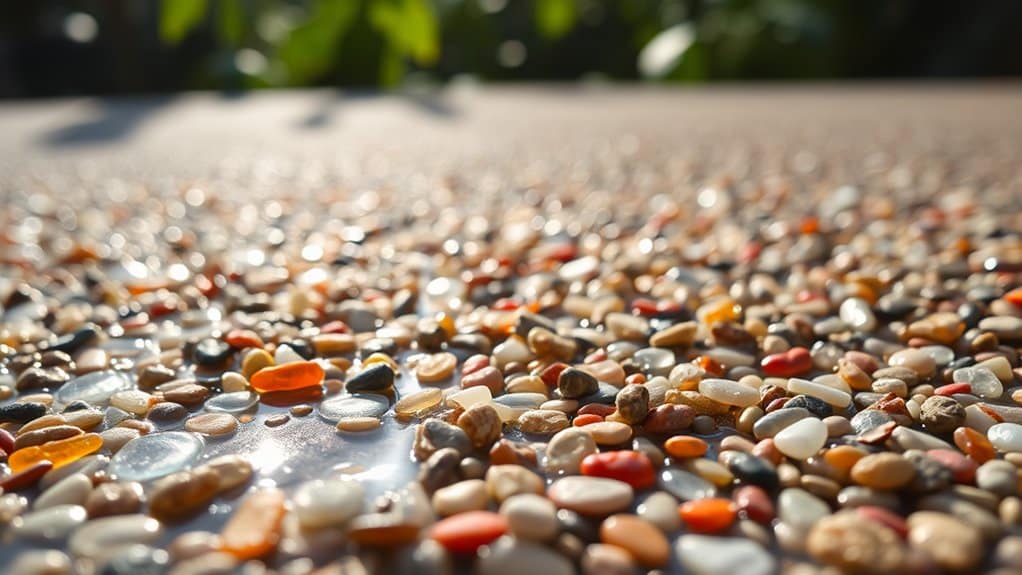
The chemical bonds in resin-bound gravel create remarkably tough surfaces that last for decades. When the resin sets, it forms strong links with the stones – rather like super-strong glue connecting pieces of a jigsaw. This bonding gives the surface impressive strength whilst still allowing slight movement during hot and cold weather, which stops it from cracking. The surface shrugs off most chemicals, including acidic substances like car battery spillage or garden fertilisers. Additionally, the process of polymerization during curing enhances the overall durability of the resin-bound surface, making it even more resilient. Well-maintained resin-bound gravel typically lasts over 20 years, even with constant foot traffic and Britain's changeable weather. It's a practical choice that keeps its good looks without constant upkeep. Furthermore, high-quality materials and professional installation significantly contribute to the longevity of these surfaces, ensuring they can withstand harsh conditions.
Permeability and Environmental Benefits
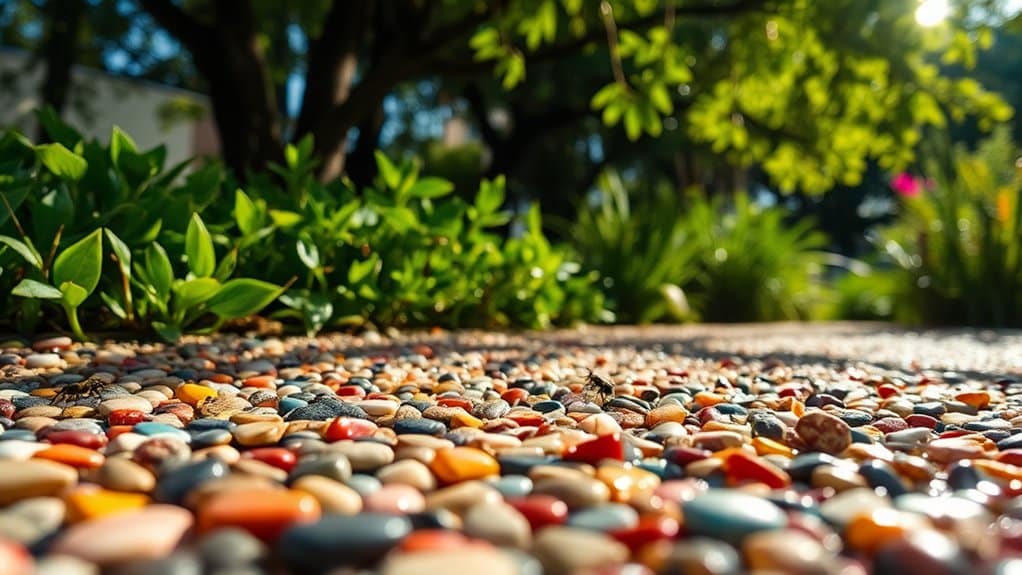
Resin-bound gravel offers both visual appeal and practical environmental benefits. The surface allows rainwater to drain naturally through to the soil below, much like a traditional garden would. This helps prevent flooding and puddles whilst reducing strain on local drainage systems – particularly useful during Britain's wet weather. The permeable nature of the surface meets sustainable urban drainage regulations (SUDS) and helps maintain groundwater levels, making it an environmentally sound choice for driveways, paths and patios. Additionally, its ability to mimic natural drainage patterns aids in alleviating pressure on local drainage systems, which is vital for effective urban water management. By allowing water to penetrate the surface, resin-bound gravel can significantly reduce urban flooding risks in areas prone to heavy rainfall.
Natural Water Drainage
Natural Water Drainage
Resin-bound gravel's permeable structure lets rainwater filter naturally through its surface, offering brilliant drainage whilst topping up groundwater levels.
It's a practical, eco-friendly choice for British gardens and driveways.
Key benefits:
- Stops puddles forming and cuts flood risks
- Reduces pressure on local drainage networks
- Supports natural water management
- Uses local and recycled materials, lowering environmental impact
- Meets UK SuDS requirements for drainage compliance
Perfect for our British climate, this surface helps manage heavy rainfall whilst maintaining a smart appearance.
The natural filtration process means less waterlogging in your garden or driveway, even during the wettest months.
Sustainable Urban Practices
Sustainable urban development often creates more concrete and tarmac surfaces, but resin-bound gravel offers a practical solution for better drainage and environmental benefits.
This surface type meets SUDS requirements, helping manage rainwater effectively – much like having a natural filter in your driveway or car park. Made with recycled materials where possible, it reduces the need for new quarrying whilst providing excellent drainage that prevents puddles and flooding.
The light-coloured stones help keep surrounding areas cooler in summer, unlike traditional black tarmac which absorbs heat.
Common applications include driveways, footpaths and car parks, where its permeable nature proves particularly useful during heavy British rainfall.
Maintenance and Longevity
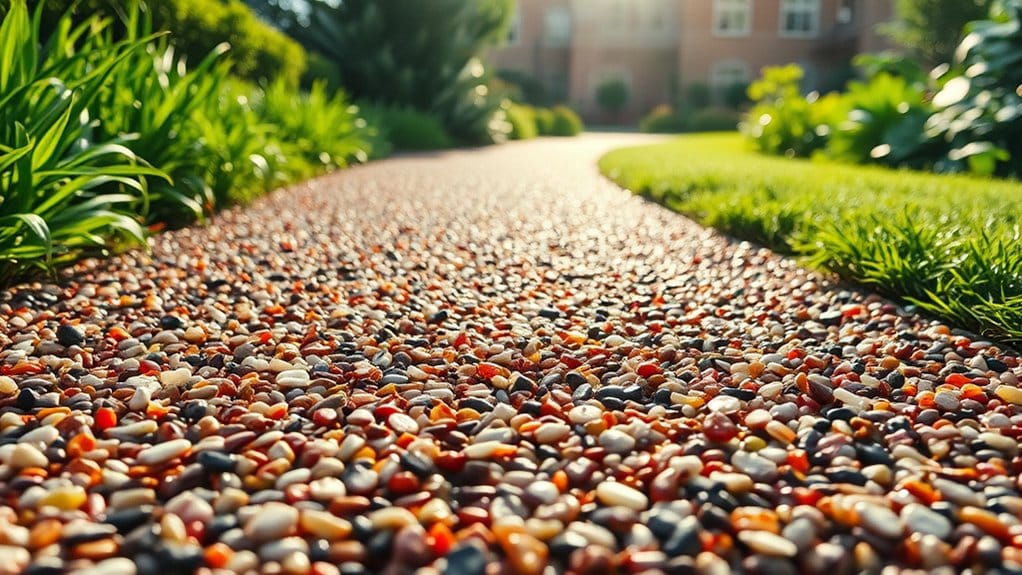
Regular maintenance of resin-bound gravel surfaces is simple: sweep away debris and occasionally pressure wash to maintain appearance.
Whilst naturally weed-resistant, a yearly application of weed killer helps keep the surface pristine.
These basic steps will extend your driveway's life and preserve its smart finish.
Easy Cleaning Process
Cleaning Resin-Bound Gravel
Keeping resin-bound gravel clean is straightforward, much like sweeping your garden path. Regular maintenance ensures your surface stays looking fresh:
- Sweep weekly with a stiff brush to clear leaves and debris
- Wash with plain water, like you'd a patio
- For stubborn marks, use gentle soap – the sort you'd use on your car
- Give it a careful pressure wash twice yearly
- Check monthly for any damage, especially after harsh weather
Simple care keeps your resin-bound surface in good nick whilst protecting your investment.
Skip harsh cleaning products – they'll damage the resin and cost you more in the long run.
Weed Resistance Benefits
Resin-bound gravel offers brilliant weed resistance, making it a top choice for UK driveways and paths. Unlike traditional gravel or block paving, the fully bonded surface stops weeds from taking root underneath.
Water drains through easily, which means weeds can't get the moisture they need to grow. You might spot the odd seedling that's blown in from nearby gardens, but a quick brush every few months sorts that out.
There's no need for regular weeding or chemical sprays like you'd need with concrete or standard gravel. This means your driveway stays looking smart and keeps its strength, lasting years with minimal fuss.
Think of it like having a protective barrier – much like a well-fitted carpet that stops anything growing through. The result? Less time spent on garden maintenance and more time enjoying your weed-free outdoor space.
Planning and Regulatory Considerations
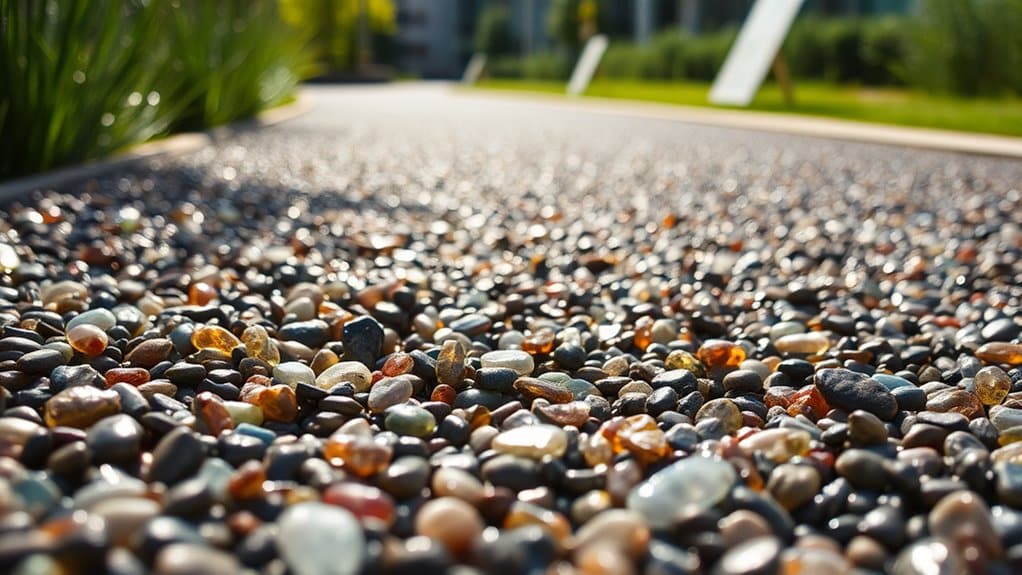
Planning Your Resin-Bound Surface Installation
Essential regulations and practical factors to ensure your resin-bound surface meets UK standards and performs well:
- SUDS Compliance: Your installation must meet current Sustainable Urban Drainage Systems rules – particularly important for front gardens and driveways in British weather.
- Base Preparation: A solid sub-base of tarmac or concrete is crucial.
Think of it like building a house – you wouldn't skip the foundations.
- Depth Requirements:
- Footpaths: 15-18mm
- Driveways: 18-20mm (thicker to handle vehicle weight)
- Pre-Installation Checks: Survey the site's drainage and ground conditions – vital given our wet climate.
- Post-Installation Care: Leave the surface to cure properly (typically 24-48 hours depending on weather) and check regularly for any issues.
Remember: Planning permission might be needed for non-permeable surfaces larger than 5 square metres – check with your local council first.
Cost and Aesthetic Benefits

Cost and Aesthetic Benefits
Resin-bound gravel offers excellent value whilst enhancing your property's kerb appeal. Installation costs between £40 to £70 per square metre, making it competitive with traditional block paving. The surface requires minimal maintenance and can boost your property value by up to 10%. Its varied colour options and distinctive texture create striking outdoor spaces.
| Aspect | Benefits | Cost Range |
|---|---|---|
| Installation | Works well on existing surfaces | £40 – £70/m² |
| Maintenance | Low upkeep, withstands wear | Minimal |
| Aesthetic Appeal | Multiple colour choices, smooth finish | Competitive |
| Property Value | Increases by 5% to 10% | Long-term investment |
The surface proves particularly practical for driveways and garden paths, where its durability and low maintenance requirements shine through. Many homeowners find the initial investment worthwhile, given the reduced long-term maintenance costs and improved property aesthetics.
Frequently Asked Questions
How Long Does the Installation Process Typically Take?
The installation of your resin-bound driveway takes 1-2 days. Whilst the surface cures within 6-12 hours in warm weather, we recommend waiting a full 24 hours before driving or parking on it to ensure proper hardening. The British weather can affect curing times, so your installer will advise on specific conditions during fitting.
Can Resin-Bound Gravel Be Used in Extreme Weather Conditions?
Resin-bound gravel performs well in British weather extremes. The material's frost-resistant properties help prevent cracking during winter freezes, whilst its textured surface offers reliable grip in icy conditions. This makes it particularly suitable for driveways and paths in areas prone to harsh winter weather, such as Scotland and northern England.
What Colors and Styles Are Available for Resin-Bound Surfaces?
A diverse range of colours and blends are available for resin-bound surfaces, from contemporary silvers through to natural browns and tans. Popular design choices amongst UK homeowners include clean geometric shapes and contrasting borders – perfect for driveways, paths and patios. These customisable finishes let you match your existing garden or property aesthetic whilst maintaining a practical, durable surface.
Is Resin-Bound Gravel Suitable for High-Traffic Areas?
Resin-bound gravel works well for driveways and paths but isn't suited for high-traffic roads. Whilst it's durable enough for daily residential and light commercial use, constant heavy vehicle traffic will significantly reduce its longevity. For busy roads or industrial areas, traditional tarmac or concrete remains the better option.
How Does Resin-Bound Gravel Compare to Traditional Paving Options?
Resin-bound gravel stacks up well against standard paving choices like concrete or block paving. Whilst the initial cost runs higher than traditional options, it proves more cost-effective long-term. Traditional surfaces often need regular weeding, pressure washing and crack repairs, but resin-bound driveways typically need just an occasional sweep and rinse. Think of it like choosing between a basic mobile phone and a smartphone – you pay more upfront for the smartphone, but its added benefits and durability make it worthwhile over time.
Conclusion
Resin-bound gravel offers a practical solution for modern outdoor surfaces. This innovative material combines loose stone with a tough resin to create a durable, long-lasting surface that's both attractive and functional. Its permeable nature helps manage rainwater effectively, reducing puddles and supporting natural drainage – particularly useful for Britain's wet climate. The surface requires little upkeep beyond occasional brushing and proves cost-effective compared to traditional paving options. Whether for driveways, pathways or garden areas, resin-bound gravel delivers reliable performance whilst being environmentally sound.
